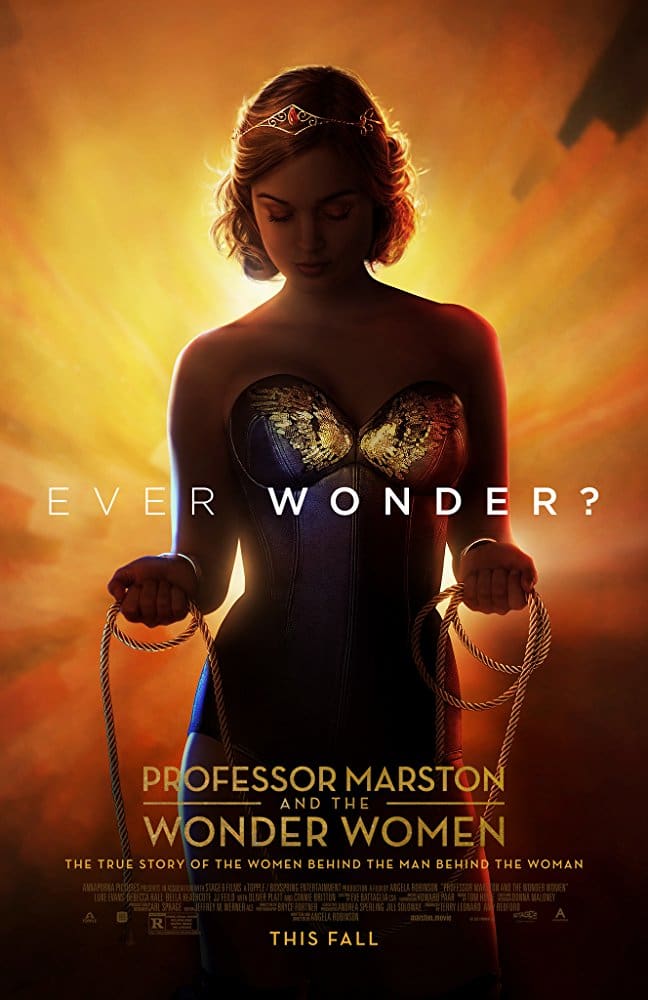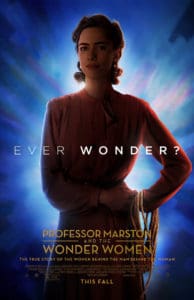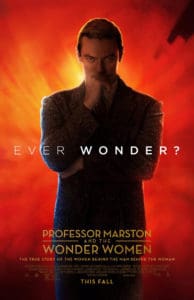
Angela Robinson could not have picked a better time to release Professor Marston & the Wonder Woman. The director, best known for her work on television, could not have known that her work would serve as a compelling companion feature to the year’s biggest pop culture phenomenon. It’s almost impossible to see this film and not immediately think of June’s Wonder Woman.
 Of course, the films are different: one is a big-budget comic book film. The other is a small-scale erotic drama. One has broad appeal to viewers of all ages; the other is very much intended for adults. One has become one of the highest grossing films of the year. The other will be lucky to break $5 million at the box office. But both films are progressive as hell, at their best when they break free of convention, and, most importantly, inform one another.
Of course, the films are different: one is a big-budget comic book film. The other is a small-scale erotic drama. One has broad appeal to viewers of all ages; the other is very much intended for adults. One has become one of the highest grossing films of the year. The other will be lucky to break $5 million at the box office. But both films are progressive as hell, at their best when they break free of convention, and, most importantly, inform one another.
Professor Marston is, of course, about the creator of Wonder Woman, a Harvard professor turned comic book writer who frequently came under fire for the controversy in his published works. While Wonder Woman may be a household name today, these comics were the subject of much controversy in the 1940s and 50s, where it was infused with subtext about sexual kinks, BDSM, lesbianism, and feminism.
Using Marston’s interrogation at the hands of the Child Study Association of America as a framing device, we see how Marston was inspired to write Wonder Woman, and why he thought the content that was viewed as objectionable by many actually elevated his work. His main inspiration: the two women with whom he shared a life, as a three-way-relationship raising children and trying to make ends meet like an average couple in suburbia.
Obviously, William Marston did not live a conventional life, so it’s a bit disappointing whenever the movie employs typical biopic tropes. Oddly enough, the film’s weakest moments are the ones focused on Wonder Woman, which feel by-the-numbers and paints the creation of the character in broad strokes. The film teeters between assuming the audience has a considerable amount of knowledge about the comic book heroine, and overly explaining details about the character or the comic book industry.
Other scenes, in which the Marstons face discrimination due to their nontraditional household, could have been pulled from just about any film about social injustices. The film is at its best when it’s driven by its three main characters and their personal beliefs, which the film explores masterfully. Robinson brings psychological debates to the screen with incredible energy, while avoiding excess narration or gross simplifications.
 The polyamorous love triangle is the heart of this film, however, and the three leads excel in these parts. Luke Evans has never been better, bringing a maturity and sympathetic tone to his part that is necessary to sell the drama. As Marston’s wife, the perpetually underrated Rebecca Hall frequently steals scene with her killer comedic timing. But Hall’s strength has always been showing the internal panic or stress that her characters are faced with, and she’s given ample opportunity to utilize that talent in this film. Finally, as a research assistant who falls in love with both Marstons, Bella Heathcote makes quite an impression with the very dramatic material she’s given.
The polyamorous love triangle is the heart of this film, however, and the three leads excel in these parts. Luke Evans has never been better, bringing a maturity and sympathetic tone to his part that is necessary to sell the drama. As Marston’s wife, the perpetually underrated Rebecca Hall frequently steals scene with her killer comedic timing. But Hall’s strength has always been showing the internal panic or stress that her characters are faced with, and she’s given ample opportunity to utilize that talent in this film. Finally, as a research assistant who falls in love with both Marstons, Bella Heathcote makes quite an impression with the very dramatic material she’s given.
Much of the discussion around Professor Marston & the Wonder Woman will revolve around the more sensational aspects of the film – namely, the intimate details about this throuple, and the fairly kinky elements of their sex life. Now, the film certainly earns its R-rating, and deserves some praise for actually depicting the BDSM-tinged scenes with the respect and realism that the Fifty Shades movies lack. But this is not some soft-core, Basic Instinct-esque trashy thriller – it’s, if anything, a thinking-person’s erotic drama.
But, more importantly, it’s a human story about the power of art, the way it reflects alternative lifestyles, and even inspires social change. The film’s not perfect, but, like this year’s Wonder Woman, it’s well meaning and entertaining. And, like the character of Wonder Woman, it has the purest of intentions and represents an important landmark in terms of onscreen representation.
Overall Rating: 7 out of 10

